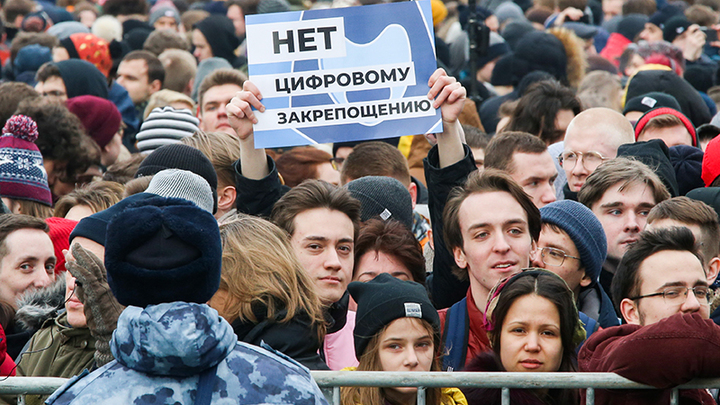- Joined
- Apr 18, 2013
- Messages
- 110,318
- Reaction score
- 100,524
- Location
- Barsoom
- Gender
- Male
- Political Leaning
- Independent
Russia is Censoring More Than Just the Internet | The Moscow Times
The Kremlin risks pushing people out of the virtual world and into the streets.

One way or another, freedom of expression will find a vocal and emotional outlet in Putin's Russia. Either via virtual reality or in the streets.
Related: Russia's Putin Signs Law Banning Fake News, Insulting the State Online
The Kremlin risks pushing people out of the virtual world and into the streets.

3/21/19
Russia’s parliamentarians have unleashed a war against online freedom of speech. Not only is their crusade unlikely to achieve its goals, but it may also bring even more protesters onto the streets. Russian authorities’ determination to quash any signs of discontent now trumps any other considerations. But their determination is short-sighted: In the long term, such restrictions will bring social and economic consequences. Is Russia’s elite prepared to deal with them? While some of these laws have already been adopted and others are still being discussed in the State Duma, the controversial new package of amendments has already prompted dissent in Russian society. For example, when it comes to the draft law on a “sovereign internet” proposed by senator Andrey Klishas and Duma deputy Andrey Lugovoy, independent experts argue that the new proposals are not only economically but also technically impossible to implement. Meanwhile, rallies against isolating the RuNet from the global internet have been held throughout the country. One such protest in Moscow attracted 15,000 people. Although the march was given prior approval by the authorities (as is legally required in Russia), police nevertheless detained 13 people. It has become obvious that implementing the new amendments will be costly; taxpayers will have to foot the bill for new measures which will weaken their own rights.
Obviously, neither the authors of these laws nor their main beneficiaries fully appreciate that even the consideration of such initiatives deepens mistrust between the authorities and the people on whose behalf they claim to rule. The new laws will particularly anger the most active and advanced internet users. These users are more than members of local online communities. They are accustomed, so to speak, to online freedom of movement, and to commercial and cultural exchanges without the limits of state borders and external restrictions. These people see the Russian state’s latest restrictions as an assault on their very identities, leading one to wonder whether the agencies which enact them are fully aware of the depth of the anger they will encounter in response. If there is one thing which can bring these inhabitants of the virtual world back into the real one and onto the streets, it is an attempt to deprive them of that world. All that remains is to hope that these regulations meet the same fate as last year’s “Yarovaya Laws,” and amount to nothing. Or at least to hope that they cause as little damage as possible. Otherwise, Russian society will remain locked in a vicious cycle, where increasing pressure from above provokes mass discontent from below which the authorities cannot placate, so they resort to even more repression. The gap between society and the authorities will widen even more until it cannot be bridged. The most absurd thing of all is that by initiating these new laws, Russia’s rulers are pushing society toward what they have been fearing and trying to avoid for years: yet another wave of mass protests.
One way or another, freedom of expression will find a vocal and emotional outlet in Putin's Russia. Either via virtual reality or in the streets.
Related: Russia's Putin Signs Law Banning Fake News, Insulting the State Online
